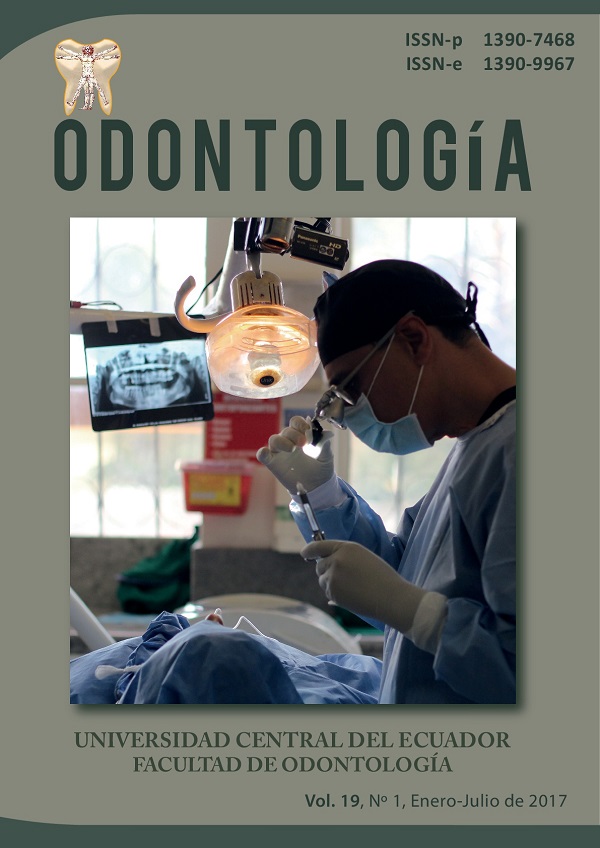Influence emerged by termal changes in the flexural strength of heat polymerized acrylics used for denture bases, with and without metallic inserts. In vitro study
Keywords:
Dental Prosthesis, Acrylic Resins, ProsthodonticsAbstract
Objective: The aim of this study was to determine if the different temperature changes affect in the flexural strength of the heat-cured acrylic for the base of dentures with and without metallic inserts by means of thermal cycling and flexion tests. Materials and Methods: Eighty samples were prepared of a heat-cure acrylic Veracril® marque according to the specification no. Nº12 de la American Dental Association (ADA) (10×65×25 mm); Four groups of 20 burettes were formed, each being Group 1: samples without realizing thermo cycling and without metallic insert. Group 2 for samples submitted to thermo cycling and without metallic insert. Group 3 for samples without thermo cycling and metallic insert in this structure. Group 4 samples submitted to thermo cycling and with metallic insert. 1000 thermal cycles were realized by means of a manual procedure of 2 minutes by every thermal cycle, corresponding 1 minute in temperature of 5 ± 2 oC and 1 minute to 55 ± 2 oC to a cycle. The flexural resistance was evaluated by a test of three points at a speed of 1mm/min. The statistical analysis was through the Student t-test with a level of significance of 5%. Results: The mean flexural resistance was 73.51, 65.65, 71.14 and 73.08 MPa. For the groups 1,2,3 and 4 respectively. It was observed that G1 was greater than G2 (p = 0.002) and G3 with G4 did not obtain values with significant statistical difference (p = 0.554). Conclusion: The thermal changes as aging processes of the material negatively influence the flexural resistance of the samples which in their structure did not have a metallic insert improving the resistance of the material.
Downloads
References
Murthy HB, Shaik S, Sachdeva H, Haralur S, Sumit K, Rupa KT. Effect of reinforcement using stainless steel mesh, glass bers, and polyethylene on the impact strength of heat cure denture base resin - An in vitro study. J Int Oral Health 2015; 7(6):71-9.
Khalid H. Causes and types of complete denture fracture. Zanco J. Med. Sci. 2011; 15(3):36-40.
Vojdani M, Khaledi AAR. Transverse Strength of Reinforced Denture Base Resin with Metal Wire and E-Glass Fibers. Journal of Dentistry Tehran University of Medical Sciences. 2006; 3(4): 167-72.
Alla R, Sajjan S, Alluri V, Ginjupalli K, Upadhya N. Influence of Fiber Reinforcement on the Properties of Denture Base Resins. JBNB. 2013; 4:91-7.
Nandal S, Ghalaut P, Shekhawat H, Gulati MS. New era in denture base resins: a review. Dental Journal of Advance Studies. 2013; 1(3): 136-43.
Pasam N, Hallikerimath RB, Gangadhar SA. Relining a metal denture base: A clinical report. The Journal of Indian Prosthodontic Society. 2006; 6(1): 51-53.
Osorio A, Guerrero J, Santos, A. Influencia de los cambios térmicos en la deflexión transversa de acrílicos para la base de dentaduras con y sin insertos metálicos. Revista Odontológica Mexicana. 2014; 18(3): 170-74.
Alignani G, Pantoja J, Takahashi J, Vasconcellos A, Mesquita M, Miranda M. Effect of thermocycling in a hard denture liner and acrylic resin after different chemical and mechanical polishing. RGO. 2015; 63(4):397-404.
Ribeiro JR, Ferraz MF, Nóbilo MA, Pessanha GE. Evaluation of varying amounts of thermal cycling on bond strength and permanent deformation of two resilient denture liners. J Prosthet Dent. 2004; 92(3):288-93.
Golbidi F, Mousavi T. Transverse Strength of Repaired Denture Base Material with Wire and Two Auto Polymerized Acrylic Resin. Journal of Dentistry Tehran University of Medical Sciences. 2007; 4(4): 183-187.
Savabi G, Savabi O, Dastgheib B, Nejatidanesh F. Effect of the processing cycle on dimensional changes of heat-polymerized denture base resins. Dent Res J 2015;12(4):301-6.
Shah SA, Khan S, Gulzar S, Khazir M. A research study to compare the flexural strength and impact strength of different heat cure and chemical cure acrylic resins under various conditions. Int J Health Sci Res. 2015; 5(6):325-29.
Kiran KS, Ananda SR, Ramesh K, Patil NP. A Comparative Study of the Effectiveness of Metal Surface Treatment in Controlling Microleakage of Two Different Metal and Acrylic Resin Interface. En: Research and Reviews: Journal of Dental Sciences. 2013; 1(2):7-12.
Rathod N, Pawar S, Naitam DN, Pasam N. Metal denture base an approach to overco me the failure of acrylic denture bases. Ijrid. 2015; 5(2): 69-75.
Harsha Rh, Preetham MP. Metal mesh dentures-A case report. IJDR. 2012; 67-68.
Bhandari S. Outcome of single maxillary complete dentures opposing mandibular teeth:A need to introspect on the prosthodontic treatment protocol. J Indian Prosthodont Soc 2016; 16(1):15-19.
Silva C, Machado A., Chaves C., PavarinaA., Vergani C. effect of thermal cycling on denture base and autopolymerizing reline resins. J Appl Sci. 2013; 21(3):219-24.
Seo R, Murata H, Hong G, Vergani C, Hamada T. Influence of thermal and mechanical stresses on the strength of intact and relined denture bases. The Journal of Prosthetic Dentistry. 2006; 96(1):59-67.


